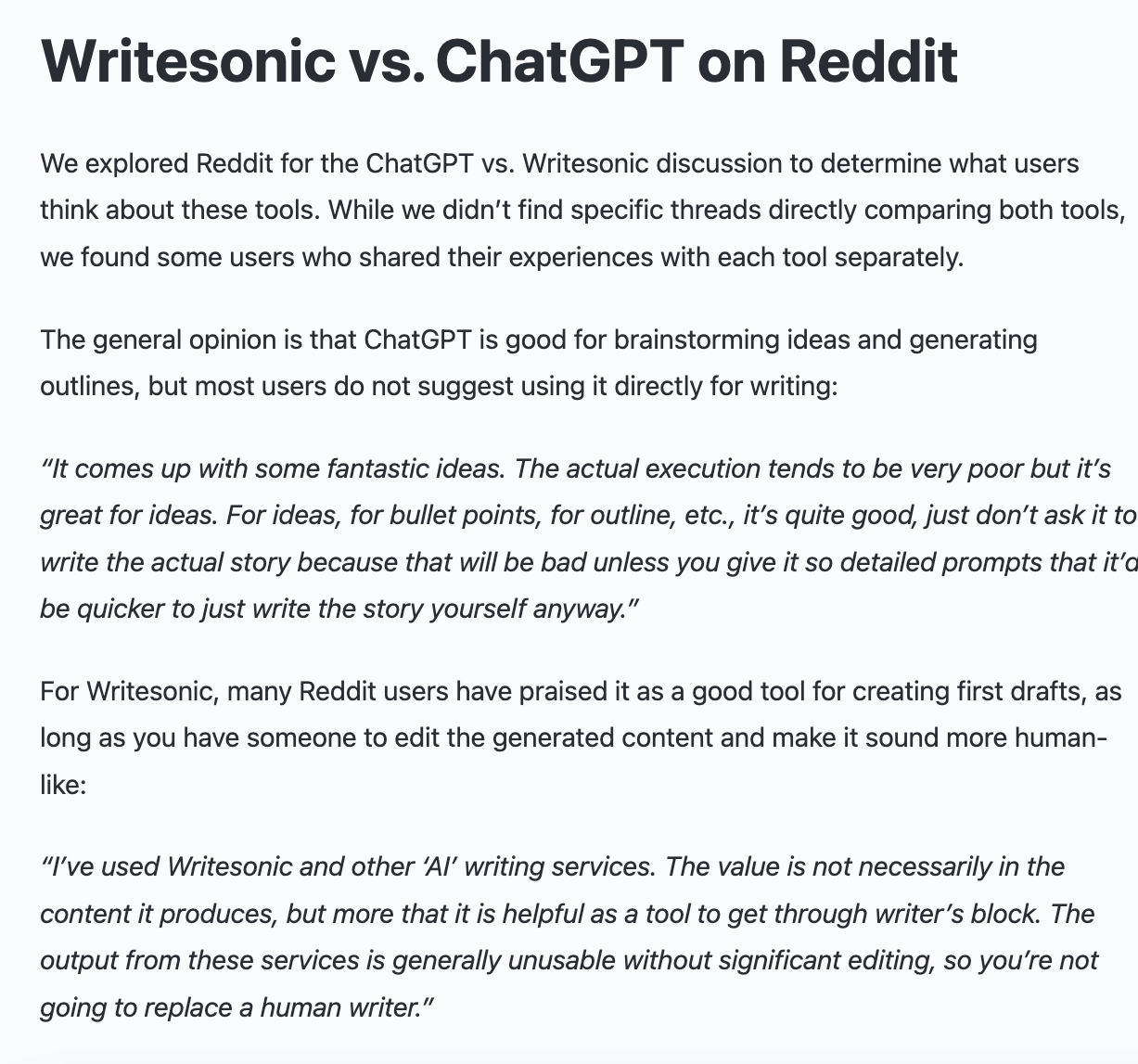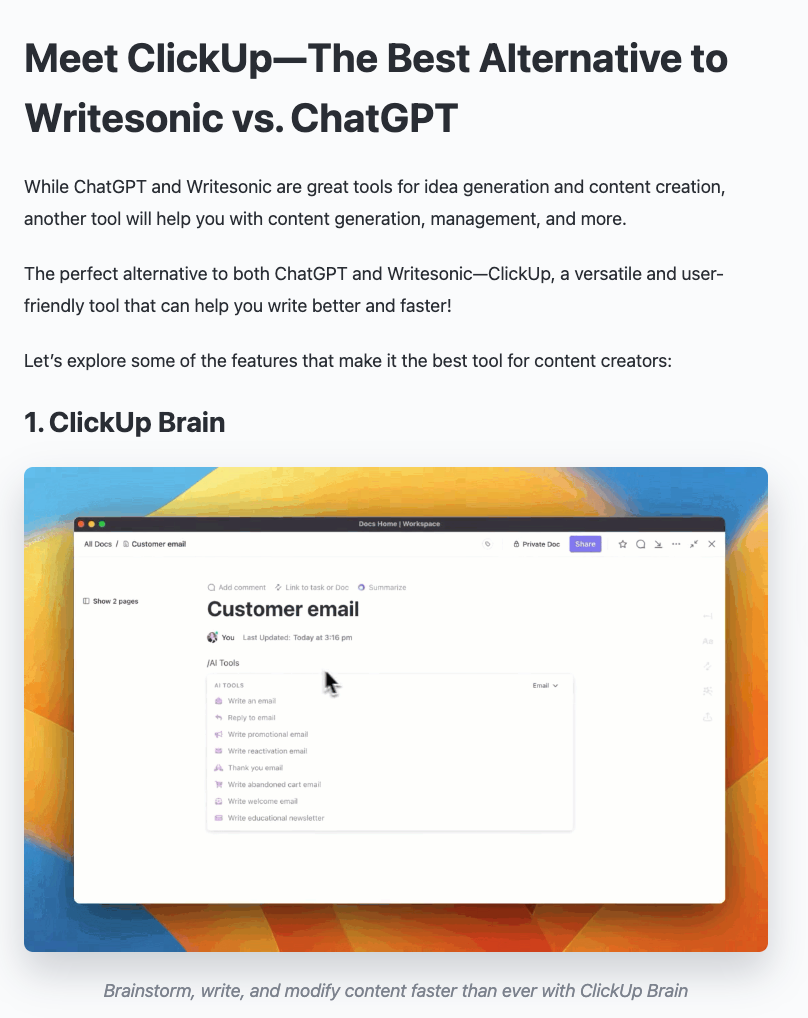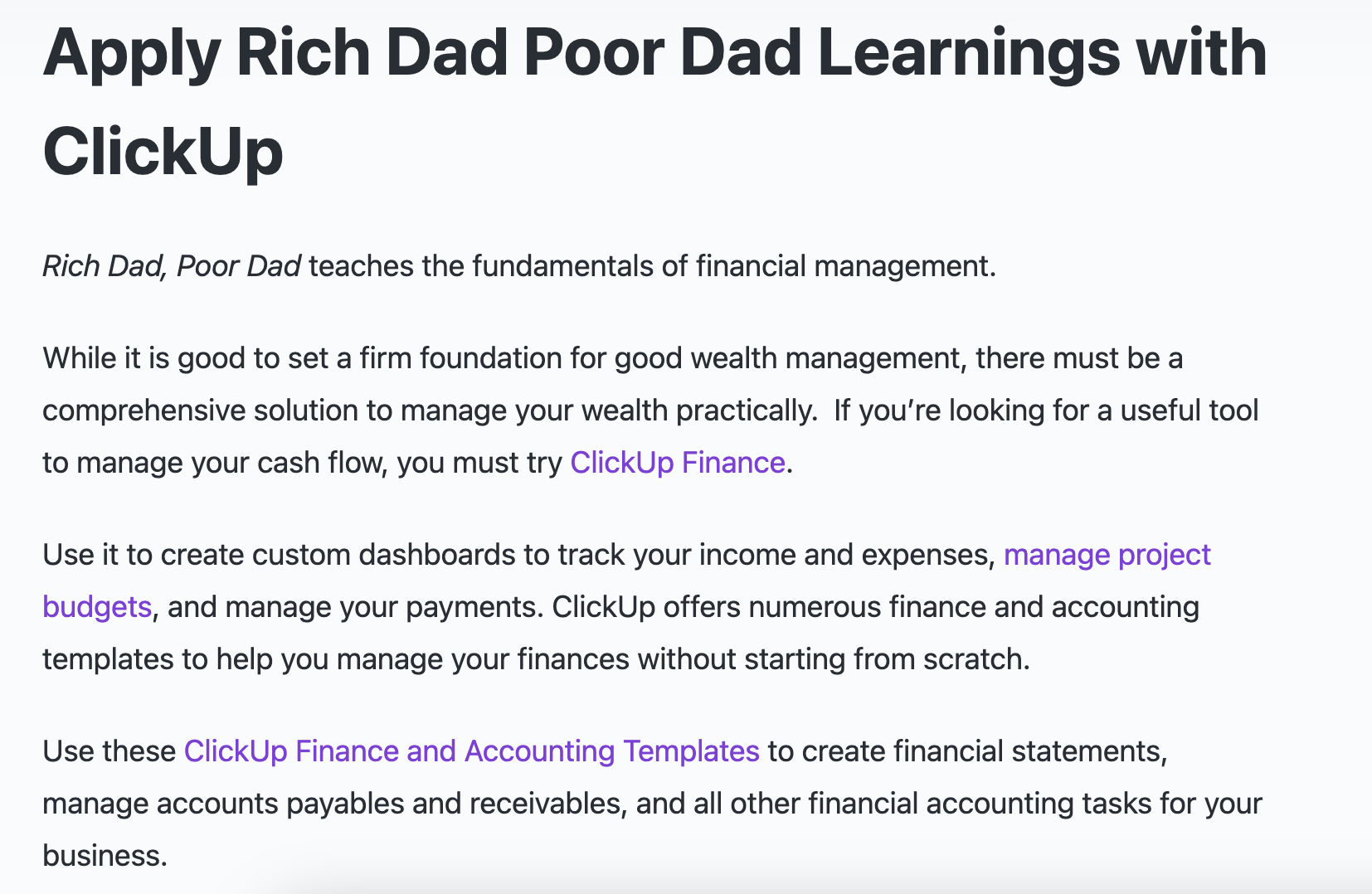ClickUp Content Strategy: Here's How They're Dominating SEO
ClickUp's blog hacks SEO & attracts readers with Reddit + industry trends! Even book summaries? Unlock their marketing secrets & turn website visitors into ClickUp fans! ➡️ Read more for the full scoop!

I've always been a huge fan of ClickUp's blog. Every month, ClickUp publishes hundreds of posts, and what truly impresses me is how seamlessly they incorporate their products into even non-ClickUp-related topics. And that's not all!
In this edition of CopyStash, I want to spotlight some of the best strategies that ClickUp uses in its articles.
But first, let’s take a look at how ClickUp is performing:
- The website attracts over 303.1K visitors through targeted keywords.
- Total traffic reaches 487.2K visitors.
- The website's traffic cost stands at $2.0M.
- Branded traffic accounts for 157.1K visits.
- Non-branded traffic remains robust with 330.1K visitors.
Now, let’s dive into what ClickUp doesn’t want to tell you about its content marketing strategy.
Takeaway 1: The Reddit Idea
If you search for “ChatGPT vs. Writesonic” an article from ClickUp will appear in the featured snippet.
Now if you check the article, you’ll see a special section there- Writesonic vs. ChatGPT on Reddit.

While this can’t be a necessary section to add because it hardly adds any value to the article, it does give a good sign to the search engine bots.
Here’s how-
1. Google's Shift Toward Authentic Content
Google has been increasingly promoting forum content because it often contains authentic, user-generated discussions and insights that users find valuable. This is part of a broader trend where Google emphasizes real-life experiences and detailed, nuanced content. By incorporating references to forums like Reddit, websites can leverage this trend to improve their search rankings.
2. Alignment with User Intent
Users often seek out specific discussions or real-world experiences when searching for information. Including "on Reddit" in headings can directly match this search intent, making the content more relevant. When Google identifies that users frequently find such content useful, it boosts the visibility of similar articles. This user-centric approach benefits both the search engine and the websites that adopt this strategy
3. SEO Benefits and Structured Data
Google's support for structured data related to forums means that articles formatted to highlight user discussions can achieve better visibility. ClickUp's approach likely includes optimizing their content with appropriate structured data, signaling to Google that the content includes valuable community insights. This structured data helps Google categorize and rank the content effectively
Hypothesis in Action
ClickUp’s strategy of using headings like "About XYZ on Reddit" can be seen as a direct application of these principles. They are effectively:
- Tapping into the popularity and trustworthiness of Reddit.
- Aligning with Google's shift toward prioritizing user-generated content.
- Optimizing their content with structured data and SEO best practices to meet Google’s evolving criteria.
Takeaway 2: Highly-focused Product-Led Content
We’re all fans of product-led content and enjoy creating pieces that directly promote our products. However, what about topics that are not directly related to our products?
Consider the "Writesonic vs. ChatGPT" article as an example, again.
ClickUp is primarily a productivity tool and doesn’t operate like Writesonic or ChatGPT. However, it does have some AI writing capabilities. In the mentioned article, ClickUp is effectively promoting its AI product, showcasing how it fits under the broader umbrella of AI technology.

The strategy here was to compare two of the most popular products in the industry and then subtly promote its own product that shares similar properties.
Smart, right?
There are several valuable lessons marketers can learn from this strategy:
1. Indirect Promotion:
ClickUp’s approach of comparing popular products (Writesonic and ChatGPT) serves as an indirect promotion. By creating content around a popular topic, they can draw in a wider audience who might not have been looking for ClickUp specifically but are interested in AI writing tools.
2. Broader Topic Relevance:
Even though ClickUp is primarily a productivity tool, they have successfully associated themselves with the AI writing space by creating relevant content. This shows that marketers can leverage broader industry trends and discussions to position their products, even if they aren't the main focus.
3. Content Variety:
Creating diverse content that covers various aspects of your industry can help in attracting different segments of your target audience. It’s a way to show the multifaceted nature of your product and its capabilities.
4. SEO Benefits:
By discussing trending topics and keywords, ClickUp can improve its SEO rankings. Articles comparing popular tools like Writesonic and ChatGPT are likely to attract searches, driving organic traffic to ClickUp’s site.
5. Thought Leadership:
Publishing comparative and analytical content positions ClickUp as a thought leader in the industry. It demonstrates their knowledge and understanding of both their product and the broader technology landscape.
6. Customer Education:
Such content helps educate potential customers about the features and benefits of different tools, including their own. It subtly introduces ClickUp’s AI capabilities, highlighting how it stands out or complements other tools.
7. Cross-Selling Opportunities:
For existing users of ClickUp, this kind of content can inform them about new or lesser-known features, potentially leading to increased usage of the platform’s AI capabilities.
8. Building Trust:
By providing a fair comparison, ClickUp builds trust with its audience. Readers appreciate honest insights and are more likely to consider ClickUp if they feel the content is unbiased and informative.
Takeaway 3: The Book Summaries
When I first saw that ClickUp is also publishing book summaries on its blog, I was skeptical. I was not able to figure out, how could this possibly help them.
But much to my surprise, it’s actually a good idea. It’s the perfect use case for ToFu content.

For example, if you search for “Rich Dad Poor Dad Summary,” you’ll see that ClickUp is ranking on 3rd or 4th position, and the volume for this keyword in the USA is approx. 20K per month.
Why ClickUp Does This:
- Broaden Content Appeal:
- Reach a Wider Audience: By including book summaries, ClickUp attracts not only those looking for project management tools but also readers interested in self-improvement, business, and productivity topics, thereby expanding their potential customer base.
- Enhance User Engagement: Diverse content keeps visitors engaged longer on the site, increasing the chances they’ll explore more about ClickUp’s offerings.
- Cross-Industry Relevance: Covering a wide range of topics helps ClickUp appeal to professionals from various industries, making their platform more universally attractive.
- Effective ToFu Content:
- Attract Top of Funnel (ToFu) Traffic: Book summaries serve as an entry point for users at the beginning of their research journey, who may later explore ClickUp’s core product.
- SEO Benefits and Organic Traffic: Targeting keywords with high search volumes, like “Rich Dad Poor Dad Summary,” which has approximately 20K monthly searches in the USA, drives substantial organic traffic to the blog.
- Build Awareness: These summaries help increase brand awareness among a broader audience, introducing them to ClickUp through valuable content.
- Build Authority and Trust:
- Provide Valuable Insights: High-quality summaries offer readers valuable information and save them time, positioning ClickUp as a helpful and trustworthy resource.
- Establish Thought Leadership: Regularly publishing insightful content on popular books and topics helps ClickUp establish itself as a thought leader in productivity and self-improvement.
- Enhance Credibility: By consistently delivering high-value content, ClickUp builds trust and credibility with its audience, encouraging repeat visits and engagement.
What Marketers Can Learn from It:
- Diversify Content Strategy:
- Expand Content Topics: Broaden your content strategy to include a variety of topics related to your core business, attracting a wider audience.
- Engage Different Audiences: Create content that appeals to various interests within your target market to increase engagement and site traffic.
- Leverage Popular Topics: Use well-known and popular topics, such as book summaries, to draw in readers who might eventually convert to customers.
- Leverage SEO and Keyword Research:
- Identify High-Volume Keywords: Conduct thorough keyword research to find high-volume search terms related to your industry and create content around them.
- Optimize for Search Engines: Ensure your content is SEO-friendly to achieve competitive rankings on search engines, driving sustained traffic growth.
- Monitor and Adjust: Continuously monitor your keyword performance and adjust your content strategy accordingly to maintain and improve your search engine rankings.
- Guide Users Through the Funnel: Design content that naturally guides users from general interest topics to more specific information about your products or services.
- Use Strategic CTAs: Place clear and compelling calls to action within your content to direct readers towards exploring your core offerings.
- Build a Conversion-Focused Content Journey: Plan a content journey that moves readers from awareness to consideration and finally to conversion, ensuring each piece of content serves a purpose in this pathway.
Stay tuned for the next edition of CopyStash, where I'll reveal even more of ClickUp's ingenious content marketing strategies. You won't want to miss the insights and tactics that can help improve your own marketing efforts to the next level!